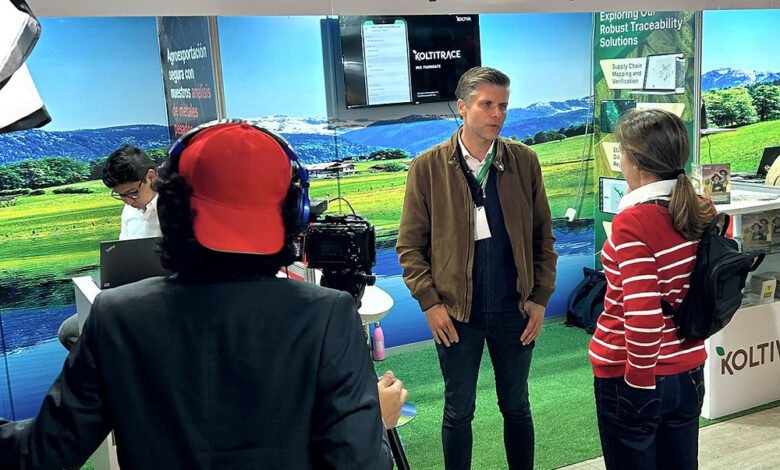Koltiva Solidifies Position as Southeast Asia’s Partner of Choice for EUDR Compliance
• Southeast Asia produces 80% of the world’s natural rubber and dominates the market, with Thailand and Indonesia generating export values of $19.7B and $5.6B, showcasing the industry’s economic significance globally (ARC: 2023). • Smallholders in Southeast Asia face unique challenges under the EUDR, including limited compliance infrastructure and fragmented trade systems. In Indonesia, only 10,000 hectares of 3.2 million smallholder plantations are registered, while in Vietnam, mixed-origin rubber complicates traceability, risking market access (Asia News: 2024). • Koltiva, a leading provider of sustainability and traceability solutions, is addressing the challenges faced by Southeast Asia’s rubber industry under the EU Deforestation Regulation (EUDR). Through its innovative services, such as Agriculture Practices Training & Coaching (KoltiSkills) and Traceability Platform (KoltiTrace), Koltiva is enabling businesses while empower smallholder producers to achieve compliance, ensuring sustainable production and market access.

Thailand – The EU Deforestation Regulation (EUDR) presents a significant challenge for Southeast Asia’s rubber industry, which accounts for 80% of global natural rubber production. Thailand, Indonesia, Vietnam, and Malaysia lead the charge, with Thailand exporting an impressive 4 million tons annually (35% of global output) and Indonesia following with 2.5 million tons. These figures aren’t just numbers; they represent a powerhouse industry driving export values of $19.7 billion in Thailand and $5.6 billion in Indonesia, firmly rooting rubber as a critical player in their economies and the global market (ARC, 2022).
Smallholders, who form the backbone of this industry, face unique hurdles in adapting to the stringent traceability and sustainability requirements mandated by the regulation. According to Regulation (EU) 2023/1115, commodities entering the European Union must be deforestation-free and accompanied by comprehensive due diligence documentation (EU, 2023). However, compliance remains a formidable task for Southeast Asia’s smallholders due to fragmented supply chains, limited infrastructure, and challenges such as land legality and mixed-origin rubber.
In response, Koltiva, a leading agritech company for enterprises to make global supply chains traceable, inclusive, and climate-smart, has introduced tailored solutions that empower smallholder producers to overcome these challenges while maintaining their livelihoods and market access.
“Koltiva is deeply committed to supporting Southeast Asia’s industry in meeting the EUDR requirements,” said Manfred Borer, CEO & Co-Founder at Koltiva. “Through our tailored solutions, we are bridging the gap between regulatory demands and smallholder capabilities, ensuring compliance, sustainable growth and market resilience.”
Koltiva provides comprehensive support to help smallholders comply with EUDR regulations. From supply chain mapping and land documentation to training and traceability through its (traceability platform) KoltiTrace and (producers’ training coaching) KoltiSkills solutions, Koltiva ensures smallholders meet standards and maintain access to global markets.
Boots-on-the-Ground Expertise in KoltiSkills
To support smallholder producers meeting the complex requirements of the EU Deforestation Regulation (EUDR), KoltiSkills offers a range of specialized services aimed at building capacity and ensuring compliance. For instance, KoltiSkills has already coached approximately 6,000 Rubber producers, equipping them with the knowledge, skills and tools needed to navigate regulatory challenges effectively. In addition, Koltiva has already mapped and registered more than 180,000 producers and verified more than 790,000 Ha of farm plots and production areas in Southeast Asia, mainly in Thailand, Vietnam, Malaysia, and Indonesia.
The field agents work closely with producers and suppliers to accurately map smallholders within the supply chain. This involves in-depth data gathering and risk assessments for each smallholder to ensure compliance with EUDR traceability requirements. Through its KoltiTrace platform, it documents the supply chain pathways, identifies risks related to deforestation and compliance gaps.
For precise traceability, KoltiSkills assists local operators in recording, monitoring, and verifying the journey of their products from seed to table. Through digitalization, KoltiSkills enables smallholders to maintain accurate records, ensuring product segregation and quality control across the supply chain. This tailored traceability solution supports EUDR compliance by helping smallholders track each step of production and avoid deforestation-linked risks.
The company provides tailored training sessions through field agents which raise awareness of sustainable practices and the importance of compliance. Group training covers general sustainability practices, while one-on-one coaching supports smallholder households with customized guidance to implement development plans. These sessions focus on empowering smallholders with the knowledge and skills needed to meet EUDR standards.
The Southeast Asia’s Regional Challenge and Opportunity
The compliance challenges facing Southeast Asia’s rubber industry stem from a variety of factors. Many smallholders lack formal land documentation, which complicates compliance. In Koltiva’s case, the Field Agent (FA) works with local governments to help producers obtain essential legal documents and certifications. This support includes guidance on certifications such as Rainforest Alliance, FairTrade, and Forest Stewardship Council, helping smallholders under certain companies align with EUDR requirements and access international markets with certified, legally documented products.
Smallholders in Southeast Asia face significant challenges in complying with the EU Deforestation Regulation (EUDR), particularly in meeting traceability, geolocation, and land ownership requirements. For instance, Indonesia’s geolocation compliance is limited, with only 10,000 hectares of 3.2 million smallholder plantation hectares having Plantation Cultivation Permits (STDB), risking a $527 million export loss (Asia News, 2024). Similarly, Vietnam and Cambodia encounter cross-border traceability issues, where mixed-origin rubber complicates tracking and compliance (Lesprom, 2023). Additionally, many smallholders lack legal land titles, limiting their ability to prove adherence to EUDR standards and restricting market access. Without sufficient support and representation in policy-making, these smallholders remain vulnerable to regulations that favor larger corporations, further deepening inequities in global trade.
Despite the hurdles, Thailand has set an example by achieving 95% registration of its producers on a national traceability platform. This success underscores the importance of centralized digital solutions for enabling compliance. Koltiva aims to replicate this readiness across the region, offering tailored solutions for countries like Indonesia, Vietnam, Malaysia, and Cambodia.
“With Koltiva’s solutions, we are not just helping smallholders adapt to the EUDR; we are empowering them to become key players in a sustainable global supply chain,” Borer added.
As the EUDR deadline approaches, collaboration between governments, industry stakeholders, and producers is essential to address the regulatory challenges and ensure no smallholder is left behind. By leveraging digital tools, capacity-building programs, and centralized traceability systems, Southeast Asia’s rubber industry has the opportunity to strengthen its position in global markets while championing sustainable practices.
The region’s success in meeting EUDR requirements will not only safeguard market access but also serve as a model for balancing environmental responsibility with economic resilience. With the right support and innovative approaches, smallholders can play a pivotal role in building a deforestation-free and sustainable global rubber supply chain.





